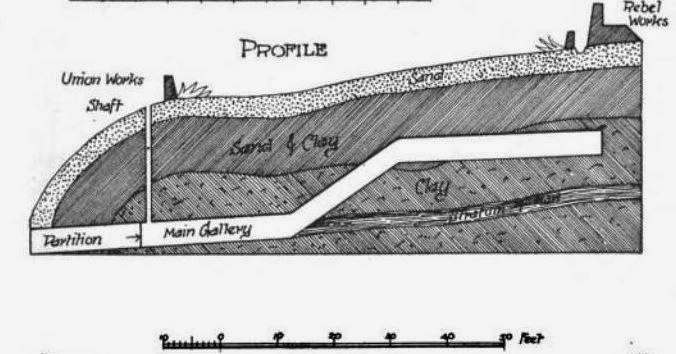Some posthumous background of Colonel Henry Clay Pleasants, engineer in charge of the great Petersburg mine . . .
In my Biographical Notice of T. Guilford Smith, published in the April Bulletin, I spoke of the Gen.Pleasonton, with whom Mr Smith was associated in the development of the block coal of Indiana, as "Franklin B. Gowen's Chief Engineer." This error, due to my hasty confusion of names, I now beg to confess and correct. Mr. Gowen's Chief Engineer was Gen. Henry Pleasants (not Pleasonton),a distinguished officer in the Union Army, Colonel of the 48th Regiment, Penna. Vols., who conceived and directed the construction of the famous mine under the fortifications at Petersburg, Va., and, in recognition of his services, was brevetted as Brigadier-General by President Lincoln. After the war he became Chief Engineer of the Reading Coal & Iron Co. He joined the Institute in 1872, remained a member until his death, in 1880, and was much esteemed and beloved by his fellow members, besides receiving their professional recognition of his technical ability and courage- the latter having been exhibited especially in the sinking of the two vertical shafts near Pottsville, described by Eckley B. Coxe*. My friendly recollection of Gen Pleasants led me to a hasty confusion of his name with that of the distinguished Union veteran Maj. Gen. Alfred Pleasonton, who after the war, became interested in Indiana coal mining, and with whom Mr. T. Guilford Smith was, for a time associated.
* A New Method of Sinking Shafts, Trans., i., 261 (New York meeting, May, 1872).
-
Mining and Metallurgy, Issue 65
American Institute of Mining and Metallurgical Engineers
1912
Obituary
General Henry Pleasants, Chief Engineer of the Philadelphia and Reading Coal and Iron Company, whose sudden death, Friday, the 26th ult., occurred at his home in Pottsville, Pa., was born at Buenos Aires, South America, February 17, 1833. His father was John Pleasants, a merchant of Philadelphia. He arrived from South America in 1810, and graduated from the Central High School in 1851. He adopted the profession of civil engineering and commenced practice on the Pennsylvania Rail road. In 1857, ho began to practice mining engineering at Pottsville. In 1801, he entered the army as Captain of Company C, 48th Pennsylvania Volunteers. He was rapidly promoted, and in June, 1864, he was commanding the Second Brigade of the Second Division, Ninth Corps, then stationed in front of Petersburg, which he rendered a most important service as engineer of the famous "Petersburg Mine." Opposite his position tho rebels had constructed a strong redoubt, which could not betaken by assault without a terrible sacrifice of the lives of his men. He conceived the Idea of exploding a mine under the work, and having obtained the permission of Gen. Burnside, began the mine June 25, 1804, with insufficient tools and against the convictions of many officers of higher rank, including Gen. Meade. He nevertheless persevered, and, in spite of obstacles which would have discouraged a less determined man, completed tho work by July 23. On July 27 he commenced putting in the powder (four tons). The mine was fired on the morning of July 30. At the precise second foretold, the fort rose and quickly settled away, leaving a vast column of smoke and dust, and completely destroying tho works. General Meade made recognition of the service rendered by General Pleasants in a general order. On October 1st he was promoted to the rank of Colonel, and on December 18th he was mustered out his term of service having expired I but on March 13th, 1865, he was advanced to the rank of Brevet Brigadier Central. On his return to Pottsville he resumed the practice of his profession, and when the Philadelphia and Reading Coal and Iron Company was formed he accepted the position of Chief Engineer, which place he held until his death.
-
The Carbon Advocate. (Lehighton, Pa.), 03 April, 1880
Among the Missing.-Brevet Brigadier General Henry Pleasant, who died at Pottsville, Pa., on Friday, April 2d, would have been better known to tame had his efforts in connection with the Petersburg mine during the late civil war been properly seconded by his brother officers. His project of blowing up the Confederate fort situated on Cemetery Hill, in front of Petersburg, Va., was looked upon with comparative indifference by Generals Grant and Meade, and was not wholly successful because, as General Grant subsequently said, "The advance was intrusted to General Ledlie, the very worst general officer in the Army of the Potomac." Had the enterprise been successful it is possible our sectional struggle might have terminated in July, 1861, at Petersburg and not in April, 1865, at Appomattox.
-
Clearfield Republican (Clearfield, Pa.), 21 April, 1880
Nota Bene: The Reading Coal and Iron Company had one of the most fractious labor records of the 1870's. It was
Franklin B. Gowen, President of the Philadelphia and Reading Coal and Iron Company, who hired Allen Pinkerton's detective agency to infiltrate and smash the
Molly Maguires in the era after the Panic of 1873.







